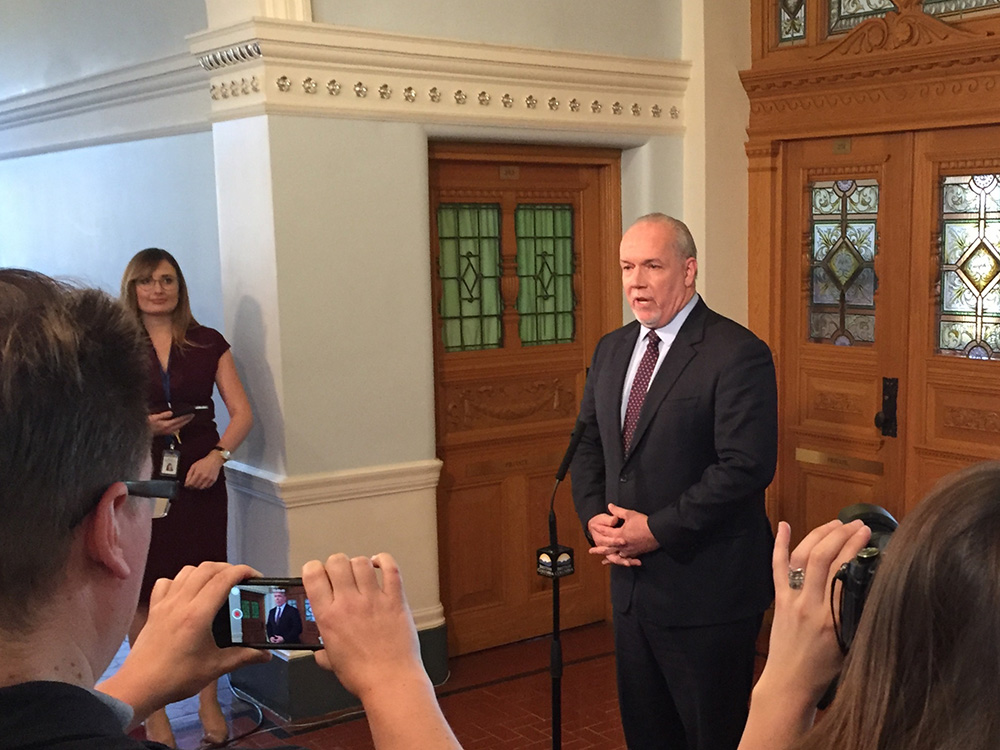With the British Columbia Utilities Commission considering a government-driven proposal to freeze BC Hydro rates, Premier John Horgan said he now believes targeting savings to people who are most in need would be a better approach.
“I am now more convinced than ever that the better course of action on affordability is not blanket reductions or freezes, but targeted to those who can best benefit from relief in this area,” Horgan said Tuesday.
“For those who are seeing a significant increase in their hydro bills, if they can’t find power-smart ways to reduce those costs, then perhaps relief from the utility or from the province is the way to do that, and I’ve directed the [BC Hydro] board chair to take a look at that.”
Horgan added he made that direction to the chair of BC Hydro shortly after he became premier last summer.
“Fantastic,” said Sarah Khan, a lawyer with the BC Public Interest Advocacy Centre, when told of Horgan’s comments. “That’s exactly what I was hoping for.”
In 2016, as part of BC Hydro’s rate design review, Khan made arguments to the British Columbia Utilities Commission on the need to make hydro rates more affordable for people with low incomes. The BCUC ruled last year that it lacked the authority to order those changes.
Khan said that with the premier’s interest in targeting help to people with low incomes, she hoped BC Hydro would draw on the work her organization has done. “We put forward extensive evidence about the program design, administration and implementation,” she said. “We’re very interested in working with them to implement it.”
In opposition, Horgan had introduced private member’s bills that would have allowed BC Hydro to provide a “lifeline rate” to low-income households.
But during the election, the NDP ran on a platform that included a rate freeze for all BC Hydro customers, a proposal the BCUC is now considering.
As Horgan put it Tuesday, “On the rate freeze, it was a commitment we made during the election campaign. We’ve asked Hydro to apply for a zero per cent increase and we’ll see how that unfolds.”
Interveners in that BCUC process have argued for and against the freeze, with several citing BC Hydro’s weak finances and heavy use of deferral accounts.
Retired civil servant Richard McCandless argued against the freeze in a Jan. 11 submission that said the reasons for it were political and that the costs would be passed on to future generations of customers. “The Commission should not be complicit in ignoring public-sector accounting standards by agreeing to further revenue deferrals,” he wrote.
The Association of Major Power Customers of BC — a group of big industrial users of electricity from sectors that include forestry, mining and petrochemical companies — argued in favour of a freeze.
“Failing to implement the freeze now will be disruptive and economically inefficient,” the submission said. “The individual bill amounts at issue are material for large industrial customers, who have planned for the bulk of [fiscal] 2019 with knowledge of the government’s rate freeze platform.” The amount of money for the freeze would not be significant for BC Hydro or the government, it said.
Acting on behalf of several groups representing people with low or fixed incomes, Khan criticized the freeze but ultimately supported it.
Rates had been kept artificially low in recent years, her submission said. There’s already $6 billion in the deferral accounts, and even without the freeze they are growing, it said. “These costs have already been incurred by BC Hydro and will have to be collected from ratepayers, including low income ratepayers, in the future.”
It cited a BC Hydro figure that said about 10 per cent of its residential customers have incomes at or below Statistics Canada’s pre-tax low income cut-off measure, or LICO.
“While we oppose BC Hydro’s application for a rate freeze for [fiscal] 2019 on cost of service rate regulation principles, after many years of rate increases, low income ratepayers cannot afford to say no to a rate freeze,” the submission said.
Khan said in an interview that the support was given with reservations. People with low incomes need the help now, but they would also end up paying for later increases that will be necessary to pay down the deferral accounts, she said.
“This problem is not going away. In fact it’s just getting worse with this rate freeze,” she said. “We’re all going to have to pay for it eventually.”
In the submission to the BCUC, Khan argued for allowing rates to rise for most customers while doing more to help people with low incomes, a principle she was pleased to hear Horgan says he supports. ![]()
Read more: Energy, BC Politics
















Tyee Commenting Guidelines
Comments that violate guidelines risk being deleted, and violations may result in a temporary or permanent user ban. Maintain the spirit of good conversation to stay in the discussion.
*Please note The Tyee is not a forum for spreading misinformation about COVID-19, denying its existence or minimizing its risk to public health.
Do:
Do not: